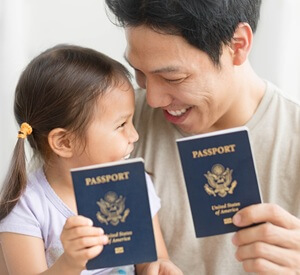Houston Family Immigration Attorney Helps In Reunification
Key Takeaways:
Family-based immigration allows U.S. citizens and lawful permanent residents to sponsor certain relatives for Green Cards, helping families reunite in the U.S. Immediate relatives of U.S. citizens have no Visa limits and often face shorter processing times. Other relatives fall into family preference categories, which may involve long waits due to annual caps.

Family is often the center of our lives, our source of strength, identity, and stability. When borders separate loved ones, the distance can be deeply painful. U.S. immigration law recognizes the importance of keeping families together and offers legal pathways to reunite them. A Houston family immigration lawyer can help you navigate these options with care, clarity, and attention to detail.
Family immigration cases are beyond just forms and procedures. They’re about people. They involve understanding eligibility rules, gathering strong documentation, and following the right steps in the right order.
How Family Immigration Works
Family-based immigration is one of the main avenues for people to obtain lawful permanent residency in the United States. It allows U.S. citizens and lawful permanent residents (LPRs) to sponsor certain relatives to join them here.
This process is governed by the Immigration and Nationality Act (INA), which sets out the eligibility rules, documentation requirements, and Visa availability guidelines. Every case is unique, shaped by the sponsor’s status and their relationship to the relative they wish to bring. Whether you are reuniting with a spouse, child, parent, or sibling, the law provides clear pathways to make that possible, though some are faster than others.
Breaking Down Immediate Relatives & Preference Categories
Determining which immigration category your family relationship falls into is one of the most important first steps in a family-based case. It affects both your eligibility and how long the process may take. U.S. immigration law organizes family sponsorship into two broad groups, immediate relatives and family preference categories, each with its own rules and timelines.
Immediate Relatives
Immediate relatives receive the highest priority in family-based immigration. These Visas are not subject to yearly caps, which means there is no waiting list for a Visa number to become available. This significantly speeds up the process.
Qualifying relationships include:
- Spouses of U.S. citizens: This includes marriages legally recognized under U.S. law, regardless of where the marriage took place.
- Unmarried children under 21 of U.S. citizens: Biological, adopted, and certain stepchildren may qualify if they meet specific requirements.
- Parents of U.S. citizens: The sponsoring child must be at least 21 years old to petition for a parent.
Immediate relatives can often complete the Green Card process in a matter of months, provided all requirements are met and documentation is complete.
Family Preference Categories
If your relationship does not fall into the immediate relative group, it may be eligible under the family preference system. These Visas are subject to annual limits, and availability is tracked in the monthly Visa Bulletin, which lists the “priority dates” currently being processed.
The categories are:
- F1: Unmarried sons and daughters (21 or older) of U.S. citizens.
- F2A: Spouses and unmarried children under 21 of lawful permanent residents (LPRs).
- F2B: Unmarried sons and daughters (21 or older) of LPRs.
- F3: Married sons and daughters of U.S. citizens.
- F4: Siblings of U.S. citizens, where the petitioner is at least 21 years old.
Because of the annual caps and high demand, preference category wait times can range from months to over a decade, depending on the category and the beneficiary’s country of origin.
Understanding whether your loved one qualifies as an immediate relative or falls under a preference category sets realistic expectations and planning your next steps. This distinction directly impacts how quickly you can reunite and which legal strategies may work best for your case.
Filing Petitions To Start The Immigration Process
The immigration journey begins with the sponsor filing Form I-130, (Petition for Alien Relative), with USCIS. This form officially establishes the qualifying relationship between the petitioner and the beneficiary. It’s a critical step because USCIS will not move your case forward until they verify that the relationship meets the requirements under immigration law.
A well-prepared petition sets the tone for the rest of the process. Submitting complete, accurate documentation from the start helps avoid unnecessary delays, Requests for Evidence (RFEs), or outright denials.
Birth Certificates For Parent-Child Relationships
If you are petitioning for your child or parent, a birth certificate showing both the parent’s and child’s names is essential. In adoption cases, you’ll need the adoption decree, proof of legal custody, and evidence that the child lived with you for at least two years.
Marriage Certificates For Spousal Sponsorships
Spousal petitions require a government-issued marriage certificate. If either spouse was married before, you must also provide divorce decrees or death certificates to show all prior marriages have legally ended.
Proof Of Termination Of Prior Marriages
USCIS needs to confirm that both the petitioner and beneficiary are free to marry. Clear, official records, such as divorce judgments or annulment orders, must be included.
Evidence Of A Genuine Relationship
In some cases, particularly for marriage-based petitions, USCIS may require proof that the relationship is genuine and not solely for immigration purposes. This can include joint bank statements, lease agreements, photos, travel records, and correspondence.
Accuracy is critical at this stage. Even small errors, like misspelled names or missing translations, can slow down the process. Once USCIS approves the petition, the case moves forward to either consular processing or adjustment of status, depending on the beneficiary’s location.
By taking the time to prepare a thorough and well-organized petition, you lay the groundwork for a smoother process. You get a better chance of reuniting with your loved one as quickly as possible.
Consular Processing vs. Adjustment Of Status
Once USCIS approves your Form I-130, the next step in the immigration process depends on where your family member is currently located. They will either go through consular processing abroad or apply for adjustment of status within the United States. Both paths can lead to permanent residency, but the procedures, timelines, and requirements differ.
Consular Processing
Consular processing is the route for beneficiaries living outside the U.S. After USCIS approval, the case is sent to the National Visa Center (NVC), which collects additional forms, civil documents, and fees. Once the NVC determines the case is complete and a Visa number is available (for preference categories), they schedule an interview at the U.S. embassy or consulate in the applicant’s country of residence.
At the interview, a consular officer reviews the application, supporting evidence, and medical exam results. If approved, the applicant receives an immigrant Visa, travels to the U.S., and is admitted as a permanent resident at the port of entry.
Adjustment Of Status
Adjustment of status is available to certain beneficiaries already in the U.S. who entered lawfully and meet eligibility criteria. Instead of leaving the country, the applicant files Form I-485 with USCIS. This pathway allows them to remain in the U.S. while processing their Green Card application.
One advantage of adjustment of status is the ability to apply for work authorization and advance parole (travel permission) while waiting. However, applicants must comply with immigration rules during this time to avoid jeopardizing their case.
Choosing between consular processing and adjustment of status depends on your loved one’s location, immigration history, and category of eligibility. A Houston family immigration attorney can evaluate your circumstances and guide you through every requirement so your case moves forward without unnecessary setbacks.
Submitting The Affidavit Of Support
Every family-based case requires the sponsor to prove they can financially support the beneficiary. By signing Form I-864, Affidavit of Support, you are committing to provide financial assistance if needed.
Sponsors generally must earn at least 125% of the federal poverty guidelines for their household size, or 100% if on active U.S. military duty, petitioning for a spouse or child. If you do not meet the requirement, assets or a joint sponsor may be used.
Common Challenges In Family Immigration
Even with careful preparation, issues can arise:
- Processing delays: Some categories take months or years; an attorney can help track progress and suggest strategies.
- Inadmissibility issues: Criminal history, prior immigration violations, or certain medical conditions may require waivers.
- Maintaining status: Beneficiaries in the U.S. must follow Visa rules to avoid jeopardizing their case.
- Requests for Evidence (RFEs): USCIS may ask for more documentation, which must be submitted promptly and completely.
Family immigration cases can face obstacles at any stage, from paperwork errors to eligibility issues. Recognizing these challenges early and addressing them with the right legal strategy can prevent delays and protect your loved one’s chance to reunite with you in the U.S.
Why Work With A Houston Family Immigration Attorney?
While it’s possible to file a family petition on your own, the process can be overwhelming, especially when every mistake or delay can mean more months apart from the people you love. An attorney helps by:
- Identifying the best category for your case.
- Preparing and reviewing all forms and evidence.
- Responding to RFEs with thorough, timely submissions.
- Advising on waivers or other legal remedies if problems arise.
Working with a Houston family immigration law firm ensures you have a knowledgeable advocate handling the details, anticipating potential issues, and protecting your family’s interests.
Your Next Step Toward Reunification
At Houston Immigration Lawyers, we know how much is at stake when you’re working to bring your family together. We treat every case with the care and urgency it deserves, guiding you through each step and addressing challenges head-on.
If you are ready to begin the process, or if your case has stalled, we can help you move forward. Contact us to schedule a confidential case review and take the next step toward reuniting with your loved ones.


